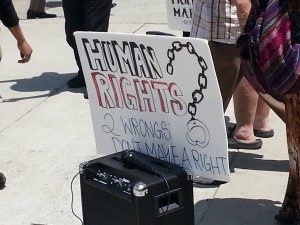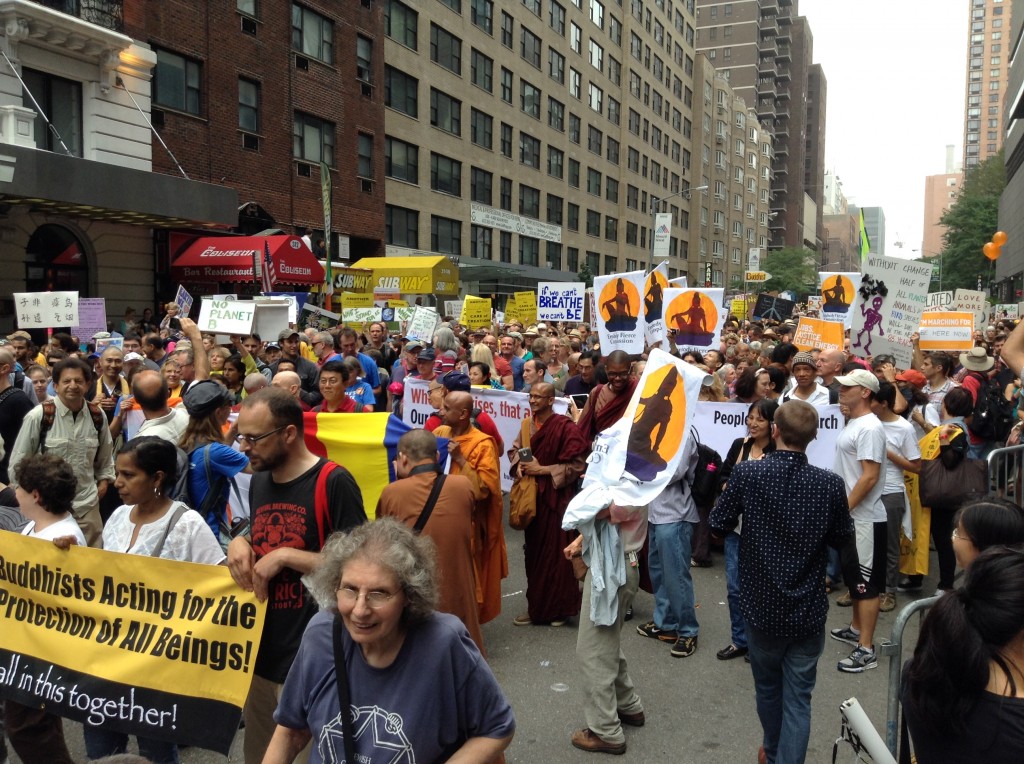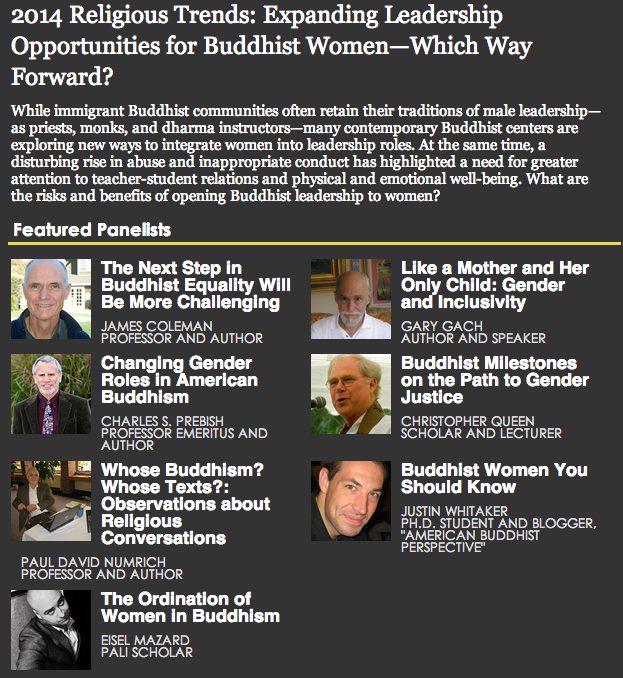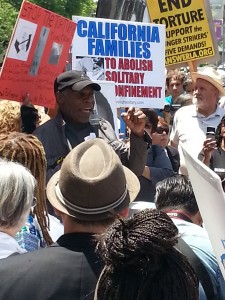
In case you’ve missed news coverage about it — and you might have, as the media has not been granted interviews with striking prisoners — a coordinated, mass hunger strike by 400 California prisoners is now in its second month. The prisoners have five demands (which I will explain in full later), but which primarily have to do with what they see as violations of their human rights by the California prison system (especially the state’s use of what are called “Security Housing Units,” or SHUs). Because the hunger strike has been going on for so long, the health of the strikers is now of great concern. As the Guardian reported this week, “Some [of the prisoners] have been hospitalized as their bodies, stripped of fat, now consume muscle, a point when health can be permanently damaged.” In addition, one prisoner, Bill Sell, has died of an apparent suicide, and there are conflicting reports about whether or not he was a participant in this protest.
The editorial board of the Los Angeles Times published an opinion this weekend about the hunger strike. While being both diplomatic and a little cautious in light of another recent editorial in their pages by California Department of Corrections and Rehabilitation head Jeffrey Beard, the editors were nonetheless forceful and clear. They write:
In so-called Supermax prisons, inmates are held, some for years at a time, in solitary confinement, deprived of human contact for 22½ hours a day. Correspondence with the outside world is restricted.
Given the prevalence of mental illness among the general population of state prisoners — an estimated 30% of such inmates have significant mental illness — it is reasonable to assume that at least some of those who are placed in secure housing units already have mental problems, and psychologists and other experts assert that even the healthiest of people are pushed to the edge by such treatment.
Prison officials argue that these units are necessary to prevent gang leaders from ordering killings or other crimes. In a Times op-ed Tuesday, California prisons chief Jeffrey Beard argued that the hunger strike was an attempt by leaders of four violent prison gangs to regain power. And we should not be naive; harsh measures may indeed be necessary to prevent shot-callers from continuing their criminal ways when locked up. But when inmates face the possibility of a lifetime in solitary confinement, as they still do, and when the key to returning to the general prison population is to “snitch” on another inmate — although that virtually guarantees gang retaliation — there is a legitimate question as to whether the institutions and the personnel we pay to do our most difficult tasks are living up to our ideal of justice.
A hunger strike may be the only way inmates in solitary can reach us with their message of protest. We may find their complaints warranted. Or we may not. But if we care about justice, we should listen.
I agree, and it was this want to listen and respond that brought me to the International Day of Action in Solidarity with the CA Prisoner Hunger Strikers and Justice for Trayvon Martin’s Family Members in downtown Los Angeles almost two weeks ago.
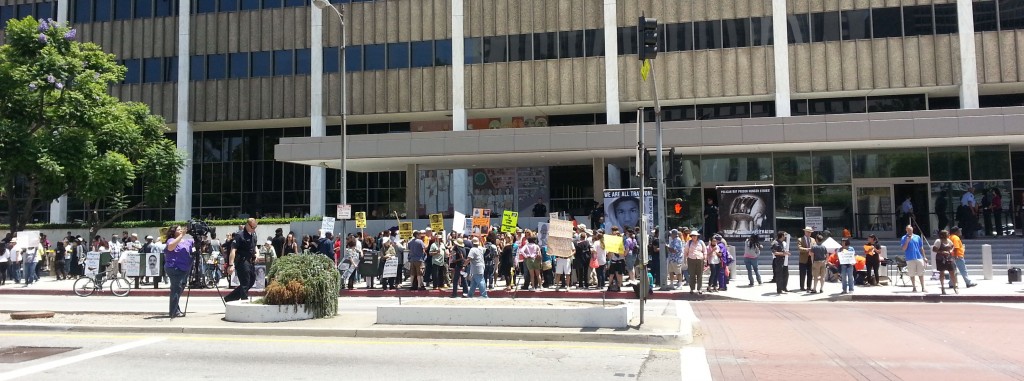
Endorsed by James Cromwell, Angela Davis, Mike Farrell, Danny Glover, Elliott Gould, Chris Hedges, Alice Walker, and Dr. Cornel West, as well as many other individuals and organizations, this action, taken simultaneously by communities across the country, was for fasting in solidarity with the prisoners, raising awareness about their five core demands, and pointing to connections between the injustice in the prison-industrial complex and Trayvon Martin’s death. The prisoners’ demands are:
- End group punishment and administrative abuse
- Abolish the debriefing policy, and modify active/inactive gang status criteria
- Comply with the U.S. Commission on Safety and Abuse in America’s Prisons 2006 recommendations regarding an end to long-term solitary confinement
- Provide adequate and nutritious food
- Expand and provide constructive programming and privileges for indefinite SHU status inmates
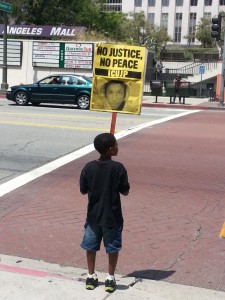
The Los Angeles action was attended by several dozen people, including endorsers/actors/activists Danny Glover (of the Lethal Weapon film series) and Mike Farrell (of TV’s M*A*S*H), former prisoners, spouses and family of prisoners, media representatives, and others. The event was emceed by Margaret Prescod, host of the Sojourner Truth Show on KPFK and representative of Women of Color Global Women’s Strike, who connected the dots between the prison hunger strike and Trayvon Martin. “We know the criminalization that killed Trayvon Martin, and the criminalization that justifies torture of prisoners, is one and the same.” Subsequent speakers, including Dolores Canales, an organizer with the California Families Against Solidarity Confinement (CFASC), and former prisoner Ernest “Big Ern” Shepard III, called on California Governor Jerry Brown to step in. “Governor Brown, how much longer can you ignore what is going on in the state of California?” asked Canales. “I am looking forward to this historical event, in the coming together of all races as we work toward bringing an end to injustices everywhere, from solitary confinement to racial profiling to mass incarceration.”
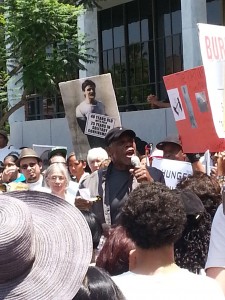
Mr. Glover too spoke about making sure to understand the connections between Trayvon Martin’s death and the prisoners’ hunger strike, urging the crowd “not to be fooled” by those who want to make them separate issues. Neon Tommy, a digital news service of the USC Annenberg School of Communication, quoted him as saying, “We have to draw connections between disenfranchised people… It is for us at this particular point to put these pieces together and keep going.” Elsewhere, in the pages of the Los Angeles Times, he was quoted as saying, “Malcolm X said, ‘We talk about jail, we all in jail. We in jail because the power defines us! We have to create a system that works for us.”
Mr. Farrell introduced the crowd to an attendee who had spent time in prison and experienced solitary confinement, only to later be found not guilty, and then offered words of inspiration for the determined activists in attendance.
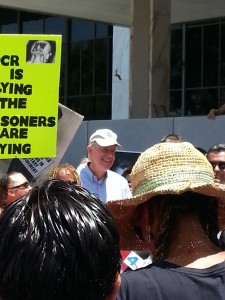
On that note, one might wonder what sorts of things they can do to be of support and help get this issue the attention that it deserves. Among them, you can contact Governor Brown here, sign two petitions from Change.Org and Californians United for a Responsible Budget (CURB), and keep an eye out for other actions at prisonerhungerstrikesolidarity.wordpress.com. In addition, action organizers recommend learning more about how you can assist and join solidarity organizations such as CURB, CFASC, Families to Amend California’s Three Strikes (FACTS), and Homie UP – Universidad Popular Homie Edition.
I would certainly encourage you to get involved however you are willing and able. Admittedly, prison work has long been a personal interest of mine — since college days, in fact, when I worked with my campus’ chapters of Anti-Racist Action and Amnesty International on prison issues in Ohio, and authored a summer project on Buddhist ministry in prisons around the globe. In addition, this fall, at University of the West, my dear and super-brilliant colleague in Religious Studies, Dr. Jane Naomi Iwamura, and I will co-teach a class for our Buddhist Chaplaincy graduate students entitled “Buddhist Ministry and the Prison-Industrial Complex.”
But, bringing it back to you the reader, it’s vital that we all talk about what’s happening in California’s prison system right now — especially Buddhists, who have been so wonderfully active in prison work (as various organizations and projects and books and films and other things will attest). This is an important moment to remember that the edicts scrawled on the ancient pillars of the Indian King Ashoka, which make up the earliest archaeological record of Buddhism in the entire world, take time to promote the humane treatment of prisoners. The great Buddhist monarch hoped that his provincial governors would be “fearless and impartial” in the administration of their duties, and that they might help prisoners and their families find whatever “happiness” they could in this life or in “the next world.” It seems to me this is not a bad standard to hold California to today.
May all be beings be happy.
May all beings be well.
May all beings be peaceful.
